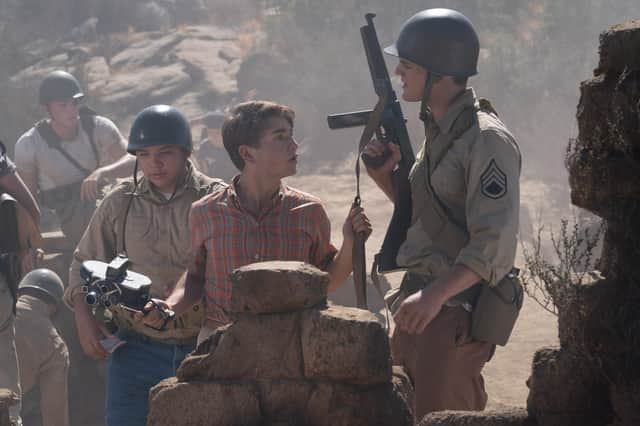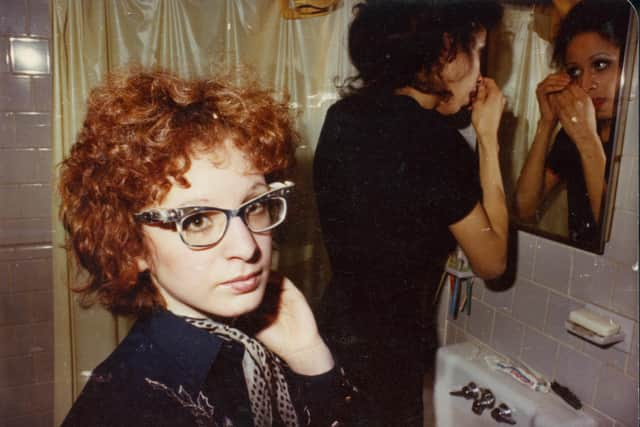Film reviews: The Fabelmans | All the Beauty and the Bloodshed | Plane


The Fabelmans (12A) *****
All the Beauty and the Bloodshed (18) *****
Plane (15) ****
Fictionalising his own complicated childhood, Steven Spielberg’s largely autobiographical, multi-Oscar-nominated film The Fabelmans begins – where else? – with a mythology-cementing trip to the movies. It’s 1952 and eight-year-old Spielberg cipher Sammy Fabelman gets his first taste of the cinema courtesy of The Greatest Show on Earth, Cecil B DeMille’s technicolour epic about circus impresario PT Barnum. It’s an appropriately profound and psychologically scarring experience, the sort the real Spielberg will inflict on future generations with Jaws and ET, but here we see it informing his sensibility as this kid takes in the traumatic and thrilling spectacle of a dramatic train crash unfurling on the big screen.
The sequence gives young Sammy (Mateo Zoryan) nightmares, so much so that he has to repeatedly recreate it with his electric train set, an act of destruction that prompts his mother to let him use their 8mm home movie camera to film it so he can watch it over and over again without risking further damage to the new toy his computer engineering father has just bought him for Hanukah. As lightbulb moments go, it’s simple and elegant, but it’s the way Spielberg condenses this formative childhood experience into a single graceful shot of Sammy projecting his crudely rendered home movie onto his own hands that makes Spielberg Spielberg. The director may be God and have the whole world in his hands, but Spielberg understands that film has the power to reflect, reveal, define and control life in ways that aren’t always harmonious and, in fact, are sometimes downright dishonest and harmful.
Advertisement
Hide AdThat’s a bold theme to explore in a film that also offers plenty of nostalgic escapism and delightful clues to his own signature style. Yet Spielberg at his best has always operated at this kind of intersection. In The Fabelmans we see a natural born filmmaker reckoning with his gift; a teenage virtuoso realising that no matter how well he’s able to use his extraordinary instincts to orchestrate the reality he thinks he wants, life – to paraphrase another Spielberg blockbuster – will always find a way to infiltrate and complicate things.
We see this most poignantly in Spielberg’s empathetic depiction of Sammy’s parents’ faltering marriage. Played by Michelle Williams and Paul Dano, their richly textured performances fill in the details as their characters’ attempts to hide the complicated truth of their relationship is captured not just by Spielberg’s camera, but the films within the film that young Sammy (now played by Gabriel Labelle) is making.


If you know anything about Spielberg’s biography you’ll know the broad strokes are largely accurate, even the bit with the monkey that later inspires a simian cameo in Raiders of the Lost Ark. But as indicated by the title, The Fabelmans is also a work of fiction and without getting too meta about it, he gradually transforms the latter stages of his adolescence into an ultra-slick, ultra entertaining teen movie that also manages to acknowledge and explore the fallout from his family’s disintegration and the casual antisemitism he experienced in high school. It’s an astonishing feat of filmmaking verve and Spielberg doesn’t go easy on himself either – but what we end up with is a truthful portrait of a prodigious talent acquiring the life experience that will one day elevate his craftsmanship into art.
The American photographer Nan Goldin is the antithesis of Spielberg. Goldin, who grew up in an outwardly respectable suburban Jewish household wracked with all kinds dysfunction, rails against of notion of narrativising or suppressing aspects of her life, preferring instead to hold on to her unvarnished memories because they make her who she is. She outlines this in the opening scenes of Laura Poitras’s newly Oscar-nominated documentary All the Beauty and the Bloodshed, a film that functions initially as a smartly put together primer on both Goldin’s incredible body of work and her latter-day campaign to force the art world to stop accepting money from the Sackler family, whose fortune has been tarnished by its long association with the opioid crisis in America. As the film progresses, though, Poitras connects these two strands in astonishing ways by candidly exploring Goldin’s tragic family history and her emergence on the underground New York art scene at the onset of the AIDS epidemic. The end result is a film that shows how her work and activism have kept alive in spirit and in voice those who have fallen by the wayside in the face of familial neglect, government inaction and corporate greed.
As stripped-down as its title, Plane is the perfect star vehicle for Gerard Butler – a prime slice of old-school action movie mayhem that makes the most of his brawny screen persona. He plays Brodie Torrance, a Scottish commercial airline pilot condemned to flying red-eye routes out of Asia after once choking-out an unruly passenger. Brodie’s also ex-RAF, a widower and desperate to get to Hawaii to visit his college-aged daughter for Hogmanay – all details intended to clue us into his hero status when the almost empty Singapore-to-Tokyo flight he’s piloting on New Year’s Eve is forced to crash-land on a remote Filipino island overrun by gangs of warring militias. Why is it overrun with gangs of warring militias? Doesn’t matter. It’s hostile territory that Butler’s character now has to negotiate if he’s to prevent his roster of international passengers (which also includes a mysterious convict plated by Mike Colter) becoming ransom fodder for a bunch of kill-crazy maniacs. French filmmaker Jean-François Richet keeps the action sleek and the tension high. Butler, meanwhile, has rarely been better.